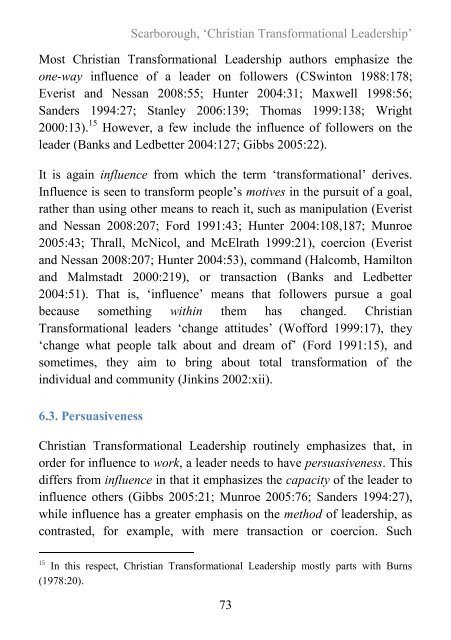Conspectus, vol. 10.pdf - South African Theological Seminary
Conspectus, vol. 10.pdf - South African Theological Seminary
Conspectus, vol. 10.pdf - South African Theological Seminary
You also want an ePaper? Increase the reach of your titles
YUMPU automatically turns print PDFs into web optimized ePapers that Google loves.
Scarborough, ‘Christian Transformational Leadership’<br />
Most Christian Transformational Leadership authors emphasize the<br />
one-way influence of a leader on followers (CSwinton 1988:178;<br />
Everist and Nessan 2008:55; Hunter 2004:31; Maxwell 1998:56;<br />
Sanders 1994:27; Stanley 2006:139; Thomas 1999:138; Wright<br />
2000:13). 15 However, a few include the influence of followers on the<br />
leader (Banks and Ledbetter 2004:127; Gibbs 2005:22).<br />
It is again influence from which the term ‘transformational’ derives.<br />
Influence is seen to transform people’s motives in the pursuit of a goal,<br />
rather than using other means to reach it, such as manipulation (Everist<br />
and Nessan 2008:207; Ford 1991:43; Hunter 2004:108,187; Munroe<br />
2005:43; Thrall, McNicol, and McElrath 1999:21), coercion (Everist<br />
and Nessan 2008:207; Hunter 2004:53), command (Halcomb, Hamilton<br />
and Malmstadt 2000:219), or transaction (Banks and Ledbetter<br />
2004:51). That is, ‘influence’ means that followers pursue a goal<br />
because something within them has changed. Christian<br />
Transformational leaders ‘change attitudes’ (Wofford 1999:17), they<br />
‘change what people talk about and dream of’ (Ford 1991:15), and<br />
sometimes, they aim to bring about total transformation of the<br />
individual and community (Jinkins 2002:xii).<br />
6.3. Persuasiveness<br />
Christian Transformational Leadership routinely emphasizes that, in<br />
order for influence to work, a leader needs to have persuasiveness. This<br />
differs from influence in that it emphasizes the capacity of the leader to<br />
influence others (Gibbs 2005:21; Munroe 2005:76; Sanders 1994:27),<br />
while influence has a greater emphasis on the method of leadership, as<br />
contrasted, for example, with mere transaction or coercion. Such<br />
15<br />
In this respect, Christian Transformational Leadership mostly parts with Burns<br />
(1978:20).<br />
73

















